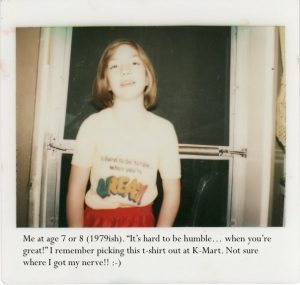Confessions of an Untraumatized 40-Something Happily Married Woman
Listen to this post as Ep135 of The Introvert Entrepreneur Podcast; in it, I share a bit of backstory about its origins.)
I have a confession to make. Well, multiple confessions.
I’ve never b een neglected or abused.
een neglected or abused.
I’ve never been robbed, unless you count a $40 Liz Claiborne purse stolen from me when I was a college freshman that had my hard-earned $70 week’s pay in it.
I’ve not been attacked or stalked or victimized.
No substance abuse issues followed by recovery.
No major accidents or incidents, no diseases or maladies that cause me to look or feel different from everyone else.
I was never in a cult, and I’ve only seen the inside of a jail because of my participation in a leadership program.
I’ve been fingerprinted, but only because I worked a sleepy (literally – I once fell asleep at my desk) bank temp job one summer in college.
I don’t have parents, siblings, children, or a spouse who has any of the above (that I know of).
I’m white. Cis hetero. Christian. American. Right-handed. I’ve been married 18+ years (to the same man!) and am doing work that is completely my choice.
I’m not even allergic to anything!
For all of my 16,450ish days on this planet, I’ve had a roof over my head, food in my belly, shoes on my feet, and people I loved and who loved me.
Sure, I have thousands of days yet to live (I hope), and anything can happen. But so far, so good.
I thought self-awareness of my painfully normal life was a recent revelation. But when I thought back to my childhood, I realized that I’ve always struggled with being normal.
Around age 9 or 10, I read about St. Therese (“The Little Flower”) and wanted to suffer to be a saint. I was fascinated with Beethoven and his deafness, thinking each time I got an ear infection, I’d go deaf. How interesting that would be! I felt like a drab little mouse with my brown hair and brown eyes and forgettable features. I longed to wear glasses or braces (ideally both), to have something different about me. I voluntarily asked for liver for dinner because I knew it was weird. And this one strikes me as particularly prophetic now: I remember passionately telling my father in my early teens that I wished I had something to overcome.
Now that I dwell in the world of personal and professional growth, I feel the burden of my inadequately normal life pressing in on me again. Sure, I’ve had (have?) chronic mild depression, professional ups and downs, times when money was suffocatingly tight, the occasional inexplicable ailment that rushes me to the doctor but turns out to be nothing. I’m an introvert in an extrovert-leaning society. And sure, I’m a woman, and even that is of little consequence in my female-dominated profession.
The bottom line is, I don’t have a story. There’s not an epic Hero’s Journey that I can call on. No trauma I’ve emerged from. I no longer have that teenage urge to overcome something, but I am still aware of my hyper-normality. Maybe because it often seems like the people society deems most credible, the ones who command the stage and bookshelves and social media spaces, are stars in their own Hero’s Journey, having emerged from life’s hardships with an inspiring message.
Let me say this before I go any further: I’m not dismissing them or suggesting their tragedy is their identity. Nor do I think that they are always at choice when their trauma becomes a commodity or they are put on a pedestal because of it.
In fact, many of them will say themselves that their aim is not to inspire you. I love Stella Young’s TED Talk titled “I’m not your inspiration, thank you very much,” in which she says that it’s not the disability she has that makes life hard, but the lie that people believe that a disability makes one exceptional.
It’s society that decides that hardships and adversity are inspiring, and everyday life is uninspiring. And those of us with a “normal” life might be wondering if we have anything to offer.
So where do I get my authority? Who am I to say “I’ve learned this from life, so listen to me”?
And how many people are there like me, who feel called to share a message or experience, but question the power and worth of their voice because it comes from the seemingly non-event that is their life?
Why would anyone care—let alone listen—if they haven’t suffered and prevailed?
When I switch into contemplative INFJ introvert mode, I realize a few things.
Life is not a competition. It’s just not. It’s not about who can out-trauma everyone else.
No one else has had my journey, or your journey. Not then, not now, not ever. Therefore, everyone has a different story to tell, one that’s not going to be heard unless YOU tell it.
Your experiences, your insights, your revelations are valid. They don’t have to be born of fire. They can be born of love and contentment.
The world needs the light and the dark. We need stories of both peace and pain. Smooth vanilla and Rocky Road.
Living and loving each day, whether it’s in spite of a debilitating illness or stinging paper cut, is a triumph.
Your complex wholeness is just as interesting because of the tiny hairline fractures, the almost invisible chinks in your armor.
There is nothing—absolutely nothing —“normal” about you. Because when it comes to human beings, there’s no such thing as “normal.” Or you could look at it another way: we’d all be considered normal, living the best we know how, once society decides to stop glorifying trauma. Normal would be admiring someone for who they are, not for their obstacles.
Where do you get your authority? Where do you get your unique voice? You get it from the millions of choices you’ve made since you were born… from the times you said “yes,” from the times you said “no,” and you lived with the consequences of those decisions.
Those choices add up to an experience no one else has had before. If you look at your story sliced and diced into isolated incidents, it’s probably a bit dull. But taken in totality, you are a multi-faceted prism that reflects and refracts light in countless directions.
Don’t dismiss your “normal” life as unremarkable. Think about that word, “unremarkable”: it means something is expected, routine, or unimpressive. And your life is anything but! Your identity and message come from the unique bundle of experiences that all add up to a perspective that no one else on this planet, living, dead, or yet to be born, shares.
The next time you ask yourself, “Who am I to say or do this?” remember this: If you have something to say, say it. Don’t wait for permission or validation from an external source. Speak out and show up from the heart.
Your truth is a remarkable truth—it’s worthy of being noticed and remarked upon—and it needs to be heard.
The post Confessions of an Untraumatized 40-Something Happily Married Woman appeared first on The Introvert Entrepreneur.



